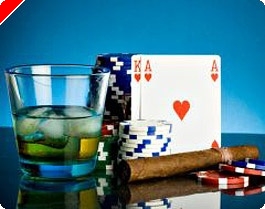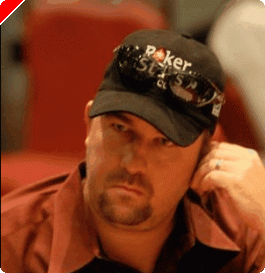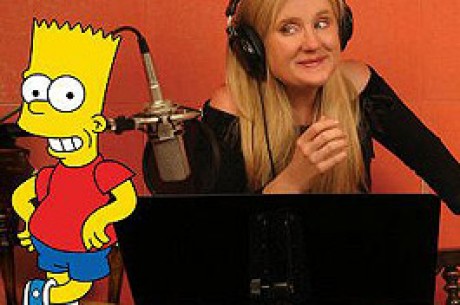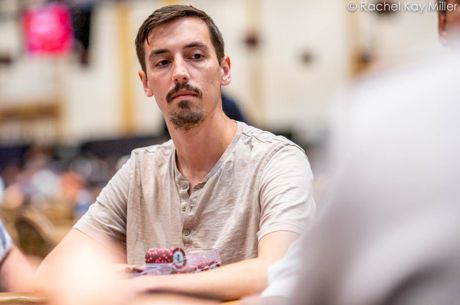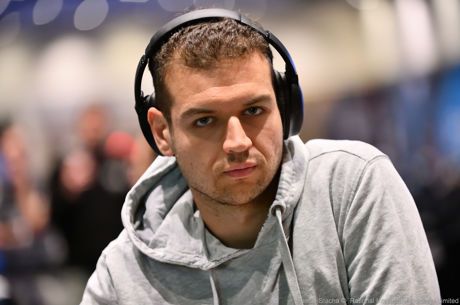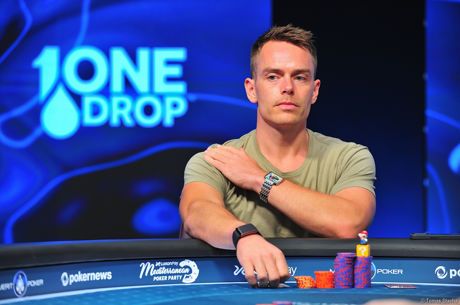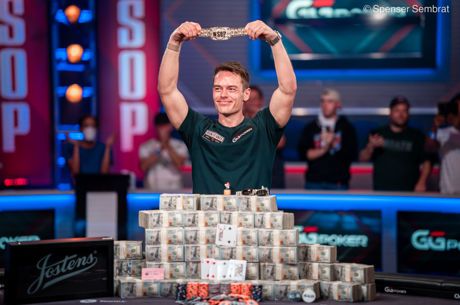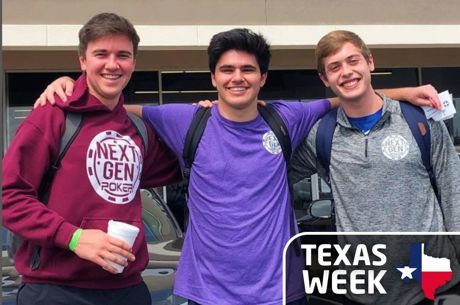The PokerNews Interview: Scott Huff
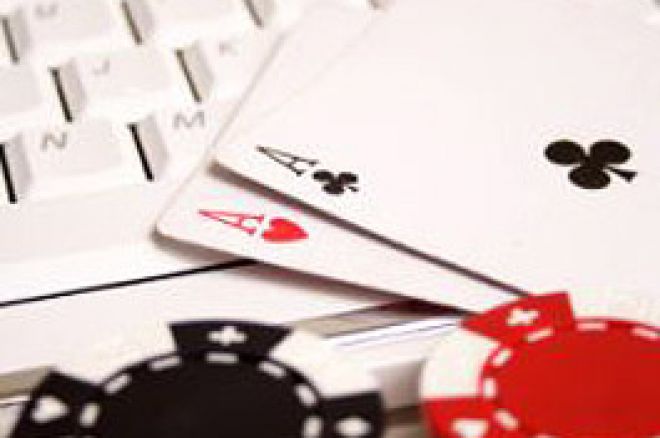
Out of all the names and faces that have been involved with poker radio journalism, there is perhaps one name most synonymous with it: Scott Huff. Huff has been at the forefront of poker radio for years. In fact, he's been a part of the same basic radio team that has been together through three incarnations now. First there was The Circuit, then PokerWire Radio, and now Huff is involved in a new poker venture: The Poker Road. Huff co-hosts two shows on Joe Sebok and Barry Greenstein's poker website: the first is talk show Big Poker Sundays with pro player Haralabos "Bob" Voulgaris, and the other is the irreverent Two Jacks in the Hole with Joe Stapleton.
Here's how Huff has managed the transition between so many venues, what he's doing in Hollywood and his future plans for poker broadcasting.
PokerNews: Let's talk about how you got started in poker radio.
Scott Huff: All right. I first got started in poker radio – I was initially tournament reporter for CardPlayer. I was doing a lot of news writing and then traveling, going on the road with the tournament circuit with BJ Nemeth, actually, who kind of mentored me in poker tournament reporting. We worked together for probably six months doing that, and then one of the executives at CardPlayer approached me about getting into some multimedia things. We came up with the idea for The Circuit, which was a pretty simple idea of long-form interviews with poker pros. We were going to try to find a professional host – see if we could find someone reliable enough to actually do it tournament-in and tournament-out, night-in and night-out. We ended up settling on Mike Matusow, who turned out to not exactly be reliable enough to do it night in and night out, although we made some pretty good radio together for the short while that it lasted. I think Mike and I did about 40 episodes of The Circuit together, which started at the Bellagio Five Diamond World Poker Classic back in December 2005. That lasted through the [NBC] National Heads-Up Poker Championship. That year was the last show that Mike did. And then Joe Sebok and Gavin Smith got involved, and kind of took it and ran with it from there.
The basic short answer is, as part of my job requirement(s), we were trying to do some multimedia. I had never done radio before, had always liked it, thought it was a cool idea, but had never really done it. So they kind of threw me into the fire with Mike of all people, and took off from there.
PN: The Circuit was very well received by the fans. What went wrong there?
SH: I mean, basically, it was a case of – I had a lot of personal relationships back in L.A., which – I moved out to L.A. to try to get involved in the entertainment industry right after college in 2003. I saw this ad to be a CardPlayer tournament reporter, jumped on it, did it, it became my life for almost two years – and I realized suddenly that if I kept going with it, I had a great position being at CardPlayer, and could probably make a career out of it for life, and ultimately, although I loved poker, I loved the game and the people around the game, I couldn't see not at least giving it a shot out here in Hollywood.
I had to put the brakes on it for myself, and I think Gavin, Joe and I had such a close relationship, that they couldn't really see doing the show with someone else. And if it was someone else, it would have to be someone of their choosing, and I don't think that's how it ended up shaking out. And so that's sort of what it was – it was personal things between my girlfriend, and just having a ton of friends – my best friend and life were out here in L.A. I needed to get back to doing the things that mattered to me. And though I tried my best to have my cake and eat it too, I really couldn't give CardPlayer what they wanted, and they couldn't give me what I wanted in order to continue the show.
PN: It then landed at PokerWire as PokerWire Radio. Were you involved with that?
SH: Yeah, actually, PokerWire Radio – there was the creation of that show, it was Joe Sebok and Gavin [Smith] wanting to do the show again. I had a friend out here who was leaving his job at MadTV. Very funny guy named Joe Stapleton. Like I said, they never really found the person they liked to do the show, so that they could continue it at CardPlayer, but when I mentioned Joe [Stapleton], Gavin and Joe Sebok were onboard with the idea of having Stapleton do the show.
So I told them about it, helped them get it off the ground, for continuity's sake. Joe Stapleton, Joe Sebok and I met. We came up with the format of the show and a lot of the bits together in the early going. I hosted the first five shows with Joe [Stapleton] as a 'wingman' sort of deal to get him acclimated to all the poker people. So that's where I left off after my five episodes thing with them. It was totally their baby after that. I would drop in enough times to have fun with them, because I definitely missed it.
PN: What do you do in the movie industry?
SH: Right now, I am an office and personal assistant to a screenwriter and director who shall remain nameless. I've been working with them for the past year, and it's been a really interesting, and at times extraordinarily stressful, situation. I've definitely learned a lot. It's doing basic assisting at this point. Hopefully, in the next couple months here, I'm moving on to work on a project with a slightly higher title with the director. That's looking good.
PN: How has the writer's strike out there affected you?
SH: The writer's strike isn't going to affect me at all, really. I believe that the project that I'm going to be working on with the director I work for is most likely going to be web-based. I have kind of a background in it – that's why he wanted to pull me in to producing web content. Right now, it hasn't really affected my position in any way because I don't work at a studio, I don't work on a lot – I actually work in the director and writer's home office. They need someone there, regardless, to run their day-to-day life, so not really at all this point, other than I'm immersed in it and know what's going on.
PN: And now you're back, but this time with Joe Sebok and Barry Greenstein's new site Poker Road. Tell us about Big Poker Sundays and the other shows you're doing for Poker Road.
SH: I'm very, very excited to be back in the poker game, for sure. Doing radio is the highlight of my week, and regardless of my full-time job, it's nice to get out and do something creative all the time, since I do very little creatively in my current position. Big Poker Sundays was just an idea I had. Basically, Joe Sebok came to a bunch of us who had worked with him in the past. He said, 'What do you have for new content ideas, and let's just make this thing happen.' My idea was just to do an AM sports-talk style show about poker. First, Sebok had talked about hosting it with me. We had talked about other names in the poker industry, possibly co-hosting with me. Then, I actually talked to my old intern from The Circuit days, Justin Shronk, and he mentioned, just in passing, Haralabos Voulgaris being a hilarious guy and what a funny episode that had been. And it just clicked that Haralabos would probably be a great fit, because I knew we had gotten along in the past. He's probably – if not the wittiest and sharpest guy I've met, he's darn close. So I figured he'd be a great guy, especially – the goal eventually is to take the show live, and to take live callers. As far as that interaction's concerned, I couldn't think of anybody better than Bob to do that.
So that's really the idea behind the show – to make it an AM talk style about poker, talk about the sport of poker more so than the ins and outs of strategy, that I sort of have exhausted. I don't think I'm necessarily interested in cultivating it from people. I'd rather just talk poker rumors, which often times are every bit as fun and interesting as the nuts and bolts of the game.
Aside from that, there's Two Jacks in the Hole that I'm doing with Joe Stapleton. That show is something that I created on my own after I left CardPlayer. We did about eight episodes out of Joe's house just screwing around and having fun. Basically, we have an opportunity now, we have an actual producer, we go into a radio studio and we do our show. It's all comedy. It has nothing to do with poker other than a segment we do called "The Obligatory Poker Segment" which we do not allow to last longer than 15 to 30 seconds. And then, we move on.
I think it's a unique piece of content for the site, so hopefully it will get people interested in poker that are maybe outside of the realm of people who want the hard-core poker stuff, but it'll drive some traffic and some eyeballs to our site. I'm as excited, if not more, about that, than any of the other stuff I'm doing for Poker Road, actually.
PN: What's it like co-hosting with Voulgaris? How has it been so far?
SH: It's been great. I think our first four episodes have been pretty solid. Like I said, he's so sharp. Really, nothing gets by him. It's a lot of fun. I feel like he completely kicks my ass on any of the arguments we have. He's got a tremendous wealth of knowledge about not just the game from a strategic standpoint, but he goes into Internet forums and he interacts with people online, and he's really exactly the perfect fit for it, because he has a wide-ranging knowledge of poker from all different angles. I think he's doing a great job and I think he's only going to get better from here.
It's always hard starting out, having chemistry with people, especially since, other than interviewing Bob on The Circuit and hanging out with him once in Vegas, that was the extent of my interaction with him through a year and a half being on the poker trail. You try to make fast friends and make chemistry happen fast, and it's going very, very well so far.
PN: Could you ever see yourself going back to poker radio full time again, or is what you have right now, with the weekends and special projects – is this a good balance for you right now?
SH: Yeah. I think it's going to become a larger part of my life in the new year, but that's not going to stop me from continuing to do the things that I've been doing in Hollywood, and continue to chase that dream, which is a long shot, but by all accounts, it's a tough business to break into. It's nice to have poker as a nest egg, it's nice because I like the people who are involved in it, and I never wanted to completely sever my ties with it. Having a chance to work with Sebok, that he's going to run a classy and interesting and unique website was important. I think I'm going to try and dedicate as much time as humanly possible to it. It will probably end up sort of fermenting into a full-time gig, but it will allow me the freedom to work on other things, and the added bonus of – I don't have to travel unless I want to, is a huge thing. Because for anyone who's ever traveled the tournament trail as media or players, can attest to – it's one hell of a grind and takes a lot out of you, so I'm happy not to do it, really. It's a big selling point to PokerRoad.com to me, for sure.
It's just such a brutal thing. It's hard with the situation I'm in because I live with my girlfriend and it's just one of these things where you can't – with CardPlayer especially, it was emerging with poker, it was such a big time in poker with so many tournaments. It was just starting to come up, so they wanted to cover every possible thing they could, and, like you said that meant a flight every week. When I took the job it was initially supposed to be five days a month on the road, but obviously (laughs) that changed in a hurry. How about three weeks on the road? Every month? It was just never-ending. So it's a really cool spot to be in, for sure. There are a lot of fun things to being on the road, too, though.

